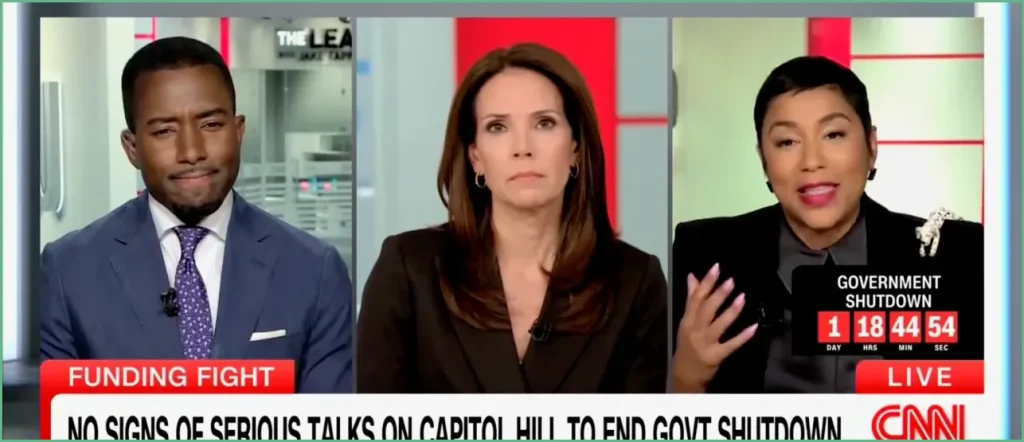Fmr Pelosi, Harris Comms Director Says Some Black Voters One Cause Of Dems’ ‘Bleeding Support’
Ashley Etienne, who once ran communications for Kamala Harris and Nancy Pelosi, told CNN that Democrats are “bleeding support” and that part of the problem is black voters drifting to “an openly racist individual.” Her blunt assessment landed like a hand grenade inside a party that prides itself on talking about racial justice while losing parts of its base. For Republicans, her comments confirm what many have been saying: Democrats are losing trust with voters they used to count on.
Etienne didn’t tiptoe around the pain points. “Absolutely. I mean, and it’s clearly working. He’s breaking fundraising numbers, and I will tell you, I’m from Texas, and the state rep is all the talk across the entire state,” she said, praising fresh talent while warning that one rising star can’t paper over deep damage. That combination of praise and alarm is useful for GOP strategists who see opportunity in Democratic fractures.
She added a stinging diagnosis: “But I will say the challenge though, is that we’re consistently looking for a savior, to quote the New York Times. The reality is the party is fundamentally broken,” Etienne said, painting Democrats as a party chasing personalities instead of fixing structural rot. Republicans view that as vindication: style without substance rarely wins sustained trust.
Etienne laid out the mechanics of the collapse plainly. “We’re facing a three-alarm fire. We are in an identity crisis. We’re bleeding support among our base voters, a growing trust cap among voter[s],” she said, describing a party losing both direction and voters. To conservatives watching closely, that describes a party that forgot how to sell optimism and economic opportunity to the very communities it claims to represent.
Her warning about black voters was the most combustible line: “And black voters are voting for an openly racist individual at double digit numbers. I mean, that’s a problem for the Democratic Party,” Etienne said. She didn’t name names, but the point landed: voters are crossing lines they once would not, and the Democrats are the ones left scrambling for answers. Republicans see this as evidence that messaging matters more than identity politics in persuading voters.
That trend is disruptive because it challenges a central Democratic assumption: you can win by default with certain coalitions. Etienne’s claim shows those coalitions are fraying and that voters are evaluating outcomes, not slogans. For conservatives, the message is clear—focus on kitchen-table issues and let the left keep debating theory.
What This Means Going Forward
State-level dynamics matter, and Etienne pointed to a Texas state representative whose momentum she describes as energizing for Democrats, even as she warns its limits. Republicans will read that as a signal to double down on state strategies in places where Democratic infrastructure is decaying. The GOP has been investing in ground operations and messaging that target working-class concerns, and that approach looks prescient if the Democratic bench keeps hemorrhaging trust.
Etienne also said what plenty of voters already feel: nobody single-handedly fixes a broken machine. “So no one person is going to fix the problems of this party. The problem is that we continually sort of ignore them, brush them under the rug and move from election to election,” she said, urging systemic fixes instead of one-off appeals. GOP operatives can take that as permission to press advantages where Democrat messaging is shallow.
The irony is obvious. A party that often accuses opponents of cruelty and division is now facing internal division and the real-world consequences of policy choices. Republicans argue that promising identity-based solutions while delivering poor results on safety, opportunity and education is why voters are open to alternatives. That argument lands with swing voters who want honest answers and practical results.
It’s also worth noting how quickly narratives shift. What used to be assumed loyalty is now contestable, and that creates breathing room for the GOP to recruit voters previously considered unreachable. Conservatives will push policies aimed at tangible improvements—job growth, school choice, and criminal justice reform—that speak to voters’ lives, not party dogma. Momentum follows when policy is concrete and benefits are visible.
Democrats can respond by doing the hard work Etienne called for—shoring up infrastructure, listening to local concerns, and admitting mistakes—but the party’s current reflex is often to double down on identity rhetoric. That reflex risks further alienating the very voters the party needs to reclaim. For Republicans, the task is simpler: keep showing up with results and clear messaging while Democrats argue about leadership and labels.
Etienne’s comments are a warning and an opportunity. They expose fault lines in Democratic assumptions and give Republicans a roadmap: be practical, be local, and don’t let your opponent set the terms. If GOP strategists execute, the next few election cycles could see those “double digit” shifts grow into permanent realignments.
The national conversation will now include not just personality and protest, but accountability and outcomes, and that suits a conservative message built on personal responsibility and economic optimism. Voters who once voted by habit are thinking again, and both parties will need to answer why anyone should trust them with the future.
!function(r,u,m,b,l,e){r._Rumble=b,r[b]||(r[b]=function(){(r[b]._=r[b]._||[]).push(arguments);if(r[b]._.length==1){l=u.createElement(m),e=u.getElementsByTagName(m)[0],l.async=1,l.src="https://rumble.com/embedJS/ukxsg"+(arguments[1].video?'.'+arguments[1].video:'')+"/?url="+encodeURIComponent(location.href)+"&args="+encodeURIComponent(JSON.stringify([].slice.apply(arguments))),e.parentNode.insertBefore(l,e)}})}(window, document, "script", "Rumble");
Rumble("play", {"video":"v6xlury","div":"rumble_v6xlury"});
n
h/t: Daily Caller
n



